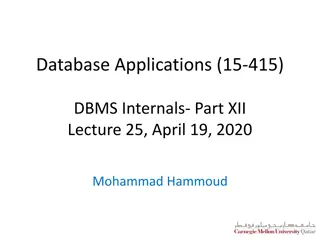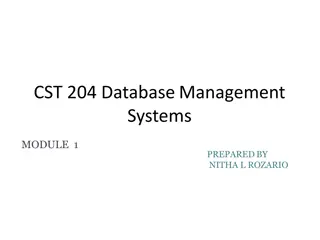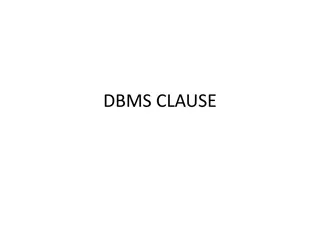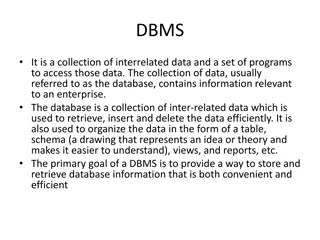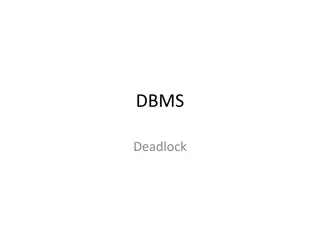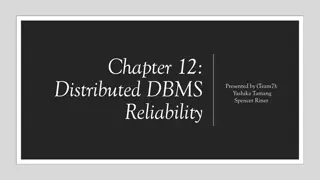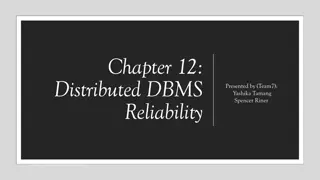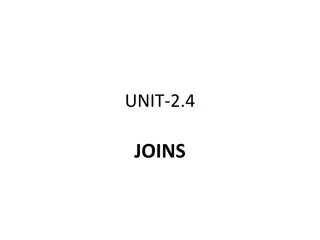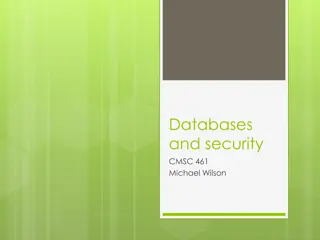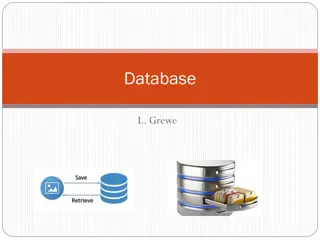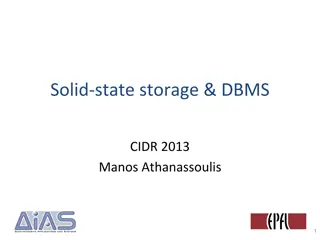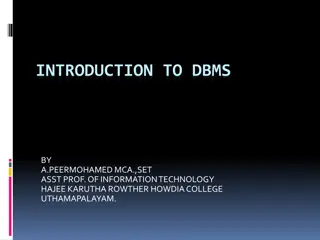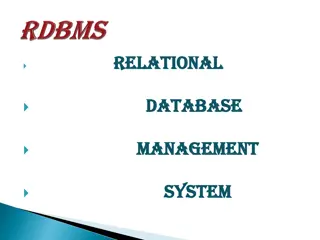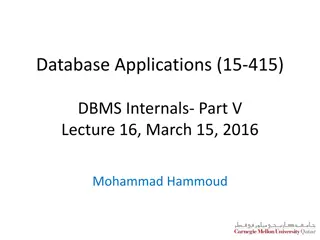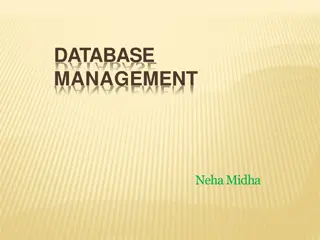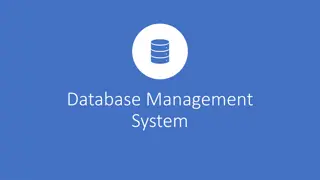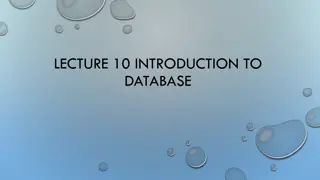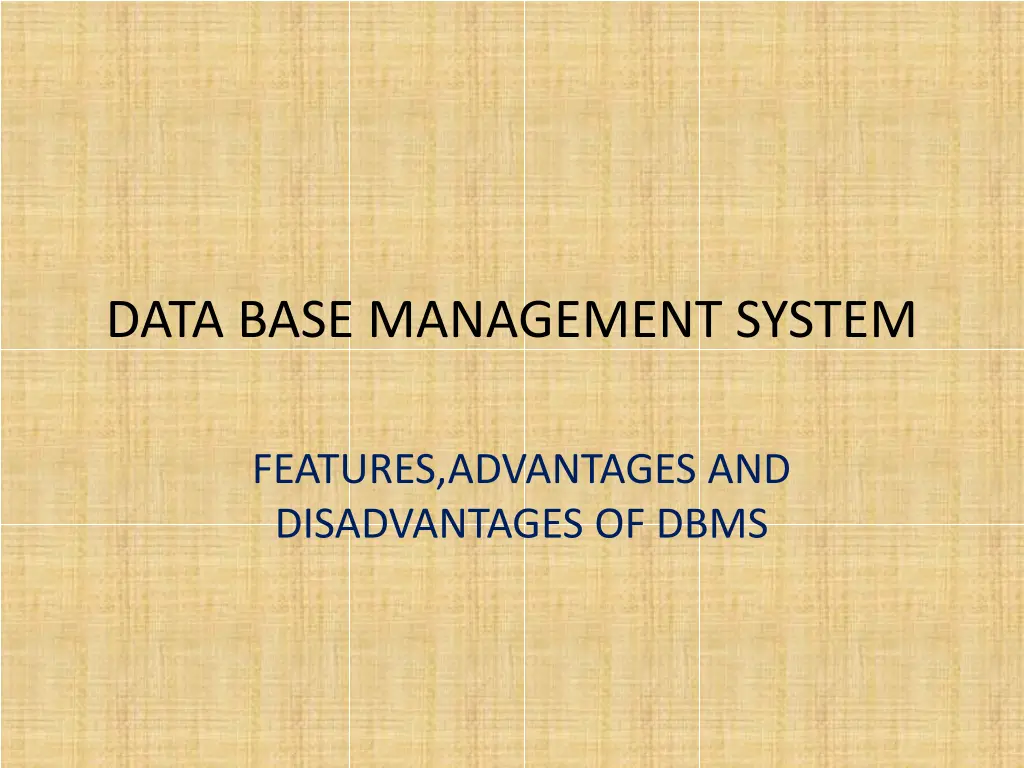
Understanding Database Management System (DBMS) Features and Advantages
"Explore the features, advantages, and characteristics of a Database Management System (DBMS), including data organization, operations, and benefits such as data control, sharing, maintenance, and time-saving capabilities."
Uploaded on | 0 Views
Download Presentation

Please find below an Image/Link to download the presentation.
The content on the website is provided AS IS for your information and personal use only. It may not be sold, licensed, or shared on other websites without obtaining consent from the author. If you encounter any issues during the download, it is possible that the publisher has removed the file from their server.
You are allowed to download the files provided on this website for personal or commercial use, subject to the condition that they are used lawfully. All files are the property of their respective owners.
The content on the website is provided AS IS for your information and personal use only. It may not be sold, licensed, or shared on other websites without obtaining consent from the author.
E N D
Presentation Transcript
DATA BASE MANAGEMENT SYSTEM FEATURES,ADVANTAGES AND DISADVANTAGES OF DBMS
DATABASE The database is a collection of inter-related data which is used to retrieve, insert and delete the data efficiently. It is also used to organize the data in the form of a table, schema, views, and reports, etc. For example: The college Database organizes the data about the admin, staff, students and faculty etc. Using the database, we can easily retrieve, insert, and delete the information.
DBMS Database management system is a software which is used to manage the database. For example:MYSQL,ORACLE. They are very popular commercial database which is used in different applications. DBMS provides an interface to perform various operations like database creation, storing data in it, updating data, creating a table in the database and a lot more. It provides protection and security to the database. In the case of multiple users, it also maintains data consistency.
OPERATIONS ON DBMS Data Definition: It is used for creation, modification, and removal of definition that defines the organization of data in the database. Data Updation: It is used for the insertion, modification, and deletion of the actual data in the database. Data Retrieval: It is used to retrieve the data from the database which can be used by applications for various purposes. User Administration: It is used for registering and monitoring users, maintain data integrity, enforcing data security, dealing with concurrency control, monitoring performance and recovering information corrupted by unexpected failure.
CHARACTERISTICS OF DBMS It uses a digital repository established on a server to store and manage the information. It can provide a clear and logical view of the process that manipulates data. DBMS contains automatic backup and recovery procedures. It contains ACID properties which maintain data in a healthy state in case of failure. It can reduce the complex relationship between data. It is used to support manipulation and processing of data. It is used to provide security of data. It can view the database from different viewpoints according to the requirements
ADVANTAGES OF DBMS Controls database redundancy: It can control data redundancy because it stores all the data in one single database file and that recorded data is placed in the database. Data sharing: In DBMS, the authorized users of an organization can share the data among multiple users. Easily Maintenance: It can be easily maintainable due to the centralized nature of the database system. Reduce time: It reduces development time and maintenance need. Backup: It provides backup and recovery subsystems which create automatic backup of data from hardware and software. multiple user interface: It provides different types of user interfaces like graphical user interfaces, application program interfaces
DISADVANTAGES OF DBMS Cost of Hardware and Software: It requires a high speed of data processor and large memory size to run DBMS software. Size: It occupies a large space of disks and large memory to run them efficiently. Complexity: Database system creates additional complexity and requirements. Higher impact of failure: Failure is highly impacted the database because in most of the organization, all the data stored in a single database and if the database is damaged due to electric failure or database corruption then the data may be lost forever.
APPLICATIONS OF DBMS Railway Reservation System In the rail route reservation framework, the information base is needed to store the record or information of ticket appointments, status about train s appearance, and flight. Additionally, if trains get late, individuals become acquainted with it through the information base update. Library Management System There are lots of books in the library so; it is difficult to store the record of the relative multitude of books in a register or duplicate. Along these lines, the data set administration framework (DBMS) is utilized to keep up all the data identified with the name of the book, issue date, accessibility of the book, and its writer. Banking Database the executive s framework is utilized to store the exchange data of the client in the information base.
APPLICATIONS OF DBMS Education Sector Presently, assessments are led online by numerous schools and colleges. They deal with all assessment information through the data set administration framework (DBMS). Credit card exchanges The database Management framework is utilized for buying on charge cards and age of month to month proclamations. Social Media Sites We all utilization of online media sites to associate with companions and to impart our perspectives to the world. Every day, many people group pursue these online media accounts like Pinterest, Facebook, Twitter, and Google in addition to. By the utilization of the data set administration framework, all the data of clients are put away in the information base and, we become ready to interface with others.
APPLICATIONS OF DBMS Broadcast communications Without DBMS any media transmission organization can t think. The Database the executive s framework is fundamental for these organizations to store the call subtleties and month to month postpaid bills in the information base. Account The information base administration framework is utilized for putting away data about deals, holding and acquisition of monetary instruments, for example, stocks and bonds in a data set.
APPLICATIONS OF DBMS Online Shopping These days, web-based shopping has become a major pattern. Nobody needs to visit the shop and burn through their time. Everybody needs to shop through web based shopping sites, (for example, Amazon, Flipkart, Snapdeal) from home. So all the items are sold and added uniquely with the assistance of the information base administration framework (DBMS). Receipt charges, installments, buy data these are finished with the assistance of DBMS. Human Resource Management Big firms or organizations have numerous specialists or representatives working under them. They store data about worker s compensation, assessment, and work with the assistance of an information base administration framework (DBMS).
APPLICATIONS OF DBMS Manufacturing Manufacturing organizations make various kinds of items and deal them consistently. To keep the data about their items like bills, acquisition of the item, amount, inventory network the executives, information base administration framework (DBMS) is utilized. Airline Reservation System This framework is equivalent to the railroad reservation framework. This framework additionally utilizes an information base administration framework to store the records of flight takeoff, appearance, and defer status.

